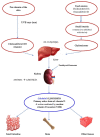The Crosstalk between Vitamin D and Pediatric Digestive Disorders
- PMID: 36292016
- PMCID: PMC9600444
- DOI: 10.3390/diagnostics12102328
The Crosstalk between Vitamin D and Pediatric Digestive Disorders
Abstract
Vitamin D is a cyclopentane polyhydrophenanthrene compound involved mainly in bone health and calcium metabolism but also autophagy, modulation of the gut microbiota, cell proliferation, immune functions and intestinal barrier integrity. The sources of vitamin D include sunlight, diet and vitamin D supplements. Vitamin D3, the most effective vitamin D isoform is produced in the human epidermis as a result of sunlight exposure. Vitamin D undergoes two hydroxylation reactions in the liver and kidney to reach its active form, 1,25-dihydroxyvitamin D. Recent studies highlighted a complex spectrum of roles regarding the wellbeing of the gastrointestinal tract. Based on its antimicrobial effect, it was recently indicated that vitamin D supplementation in addition to standard eradication therapy might enhance H. pylori eradication rates. Moreover, it was suggested that low levels of vitamin D might also be involved in the acquisition of H. pylori infection. In terms of celiac disease, the negative effects of vitamin D deficiency might begin even during intrauterine life in the setting of maternal deficiency. Moreover, vitamin D is strongly related to the integrity of the gut barrier, which represents the core of the pathophysiology of celiac disease onset, in addition to being correlated with the histological findings of disease severity. The relationship between vitamin D and cystic fibrosis is supported by the involvement of this micronutrient in preserving lung function by clearing airway inflammation and preventing pathogen airway colonization. Moreover, this micronutrient might exert anticatabolic effects in CF patients. Inflammatory bowel disease patients also experience major benefits if they have a sufficient level of circulating vitamin D, proving its involvement in both induction and remission in these patients. The findings regarding the relationship between vitamin D, food allergies, diarrhea and constipation remain controversial, but vitamin D levels should be monitored in these patients in order to avoid hypo- and hypervitaminosis. Further studies are required to fill the remaining gaps in term of the complex impact of vitamin D on gastrointestinal homeostasis.
Keywords: children; digestive disorders; vitamin D.
Conflict of interest statement
The authors declare no conflict of interest.
Figures
Similar articles
-
Bolus Weekly Vitamin D3 Supplementation Impacts Gut and Airway Microbiota in Adults With Cystic Fibrosis: A Double-Blind, Randomized, Placebo-Controlled Clinical Trial.J Clin Endocrinol Metab. 2018 Feb 1;103(2):564-574. doi: 10.1210/jc.2017-01983. J Clin Endocrinol Metab. 2018. PMID: 29161417 Free PMC article. Clinical Trial.
-
Vitamin D deficiency in patients with intestinal malabsorption syndromes--think in and outside the gut.J Dig Dis. 2015 Nov;16(11):617-33. doi: 10.1111/1751-2980.12283. J Dig Dis. 2015. PMID: 26316334 Review.
-
Role of vitamin D on gut microbiota in cystic fibrosis.J Steroid Biochem Mol Biol. 2018 Jan;175:82-87. doi: 10.1016/j.jsbmb.2016.11.001. Epub 2016 Nov 3. J Steroid Biochem Mol Biol. 2018. PMID: 27818276 Free PMC article. Review.
-
A Clinician's guide to vitamin D supplementation for patients with cystic fibrosis.J Clin Transl Endocrinol. 2021 Nov 6;26:100273. doi: 10.1016/j.jcte.2021.100273. eCollection 2021 Dec. J Clin Transl Endocrinol. 2021. PMID: 34815946 Free PMC article.
-
Vitamin D in liver diseases: from mechanisms to clinical trials.J Gastroenterol Hepatol. 2013 Aug;28 Suppl 1:49-55. doi: 10.1111/jgh.12016. J Gastroenterol Hepatol. 2013. PMID: 23855296 Review.
Cited by
-
Association of vitamin D and functional dyspepsia: a case-control study.Ann Med Surg (Lond). 2023 Aug 16;85(10):4667-4673. doi: 10.1097/MS9.0000000000001204. eCollection 2023 Oct. Ann Med Surg (Lond). 2023. PMID: 37811112 Free PMC article.
-
Correlation between fat-soluble vitamin levels and inflammatory factors in paediatric community-acquired pneumonia: A prospective study.Open Med (Wars). 2024 Jun 7;19(1):20240972. doi: 10.1515/med-2024-0972. eCollection 2024. Open Med (Wars). 2024. PMID: 38859879 Free PMC article.
-
Gastrointestinal health and nutritional strategies in autism spectrum disorder.J Gastroenterol. 2025 Aug;60(8):933-946. doi: 10.1007/s00535-025-02269-1. Epub 2025 Jun 18. J Gastroenterol. 2025. PMID: 40531376 Free PMC article. Review.
References
-
- Wang J., Thingholm L.B., Skiecevičienė J., Rausch P., Kummen M., Hov J.R., Degenhardt F., Heinsen F.-A., Rühlemann M.C., Szymczak S., et al. Genome-Wide Association Analysis Identifies Variation in Vitamin D Receptor and Other Host Factors Influencing the Gut Microbiota. Nat. Genet. 2016;48:1396–1406. doi: 10.1038/ng.3695. - DOI - PMC - PubMed
Publication types
LinkOut - more resources
Full Text Sources


